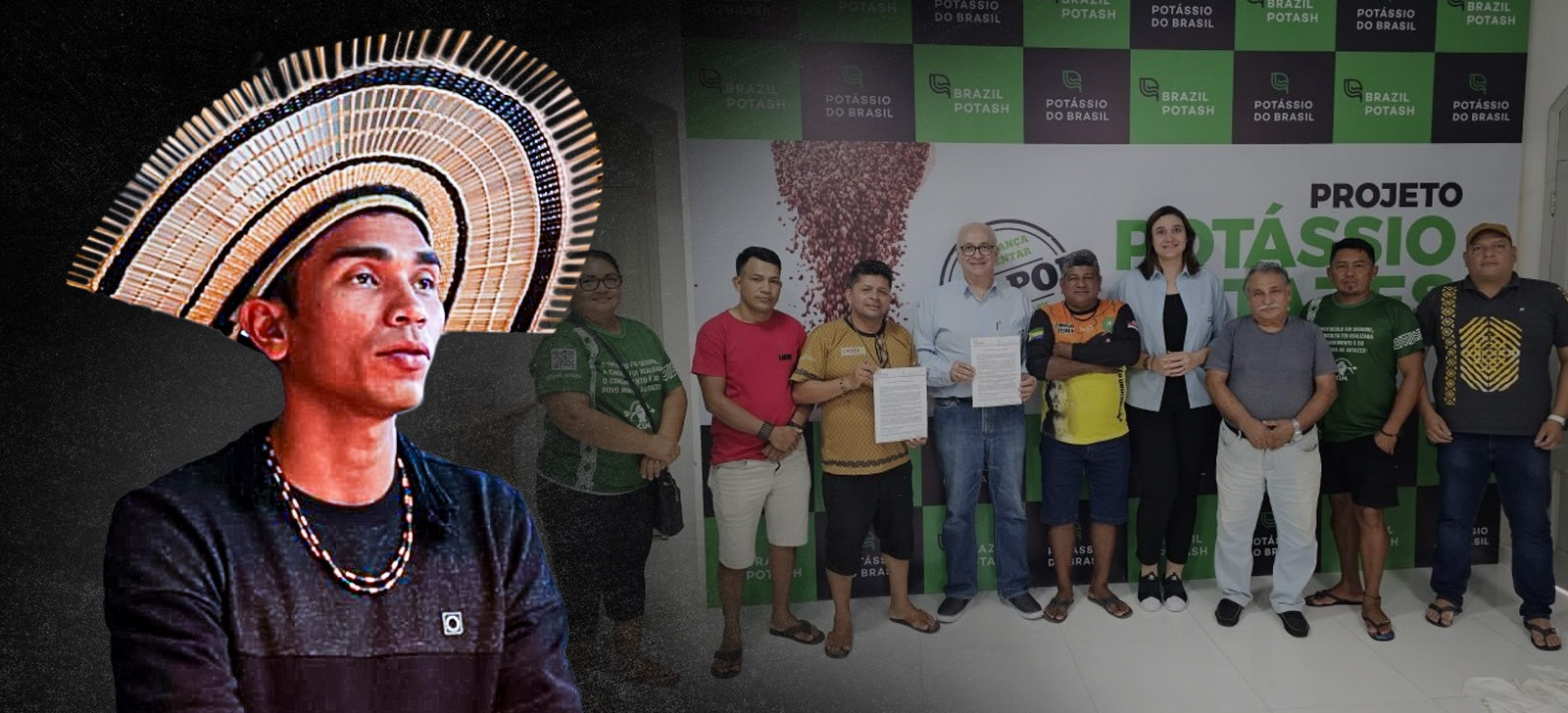Leadership criticizes indigenous people who signed agreement with mining company in Amazonas
14 de January de 2025

By Thais Matos – From Cenarium
MANAUS (AM) – “When they say they represent the Mura people, we are not included.” This statement comes from indigenous leader Gabriel Mura, from Soares Village in Autazes (AM), regarding the Preliminary Cooperation Agreement signed between the company Potássio do Brasil and the Mura Indigenous Council (CIM) to establish a potassium mine on the banks of the Madeira River.
The exploration and drilling site of the Potássio do Brasil project overlaps traditional territories occupied by the Mura people in the municipality. These areas, where fruit collection, nut extraction, hunting, and fishing take place, are currently undergoing a demarcation process led by the National Foundation for Indigenous Peoples (Funai).
“The Mura Indigenous Council supports causes that, in our view, are not favorable to the lives of indigenous peoples. The Mura people of Soares are against the Potássio Autazes project and were not even consulted as required by our consultation protocol“, Gabriel told CENARIUM on Tuesday, the 14th.

The indigenous person claims that all agreements and licenses made between the company and CIM were violated, with contraventions of the Federal Constitution, the International Labor Organization (OIT) 169, in addition to the Trincheiras Consultation protocol: Yandé Peara Mura.
“Soares, the community most affected by this project, was not consulted at any time by the company or the state. What they are actually trying to do is make us invisible by claiming it is not indigenous land and that we are not indigenous. But anthropological studies prove our existence here for over 200 years”, the leader added.
The potassium mining project in the Soares Village area by Potássio do Brasil LLC was authorized through installation licenses issued by the Institute for Environmental Protection of the Amazonas State (Ipaam), despite numerous issues identified in environmental impact studies and the licensing process, as well as ongoing legal questions.
Regarding the land demarcation, Gabriel Mura stated that the process began in May of last year under Funai but has since stalled.
“The demarcation was requested together with CIM, back when they had not yet been corrupted by Potássio do Brasil. Today, the council’s current leadership claims it is not indigenous territory. Funai promised to return in August 2024 but did not come. Now, they are promising to return in February this year“, he explained to the reporter.
CENARIUM contacted Funai for an update on the technical studies for demarcation, but no response was received by the time of publication.
Agreement Between Indigenous People and Mining Company
On Monday, the 13th, Potássio do Brasil announced that it had signed a Preliminary Cooperation Agreement with the Mura Indigenous Council (CIM) of Autazes. According to the company, this agreement was developed in alignment with the requirements of the Mura people and involved extensive community engagement led by CIM, a representative entity of the ethnicity in Autazes.
According to the company’s official website, the agreement establishes a comprehensive preliminary framework for collaboration between the project and the Mura indigenous communities.
“The key elements include: commitments to socioeconomic and environmental development programs aligned with current environmental licensing and legal requirements; implementation of the Mura Well-Being Plan – a sustainable development program and investment in social and cultural development initiatives for indigenous villages represented by CIM“, says Potássio do Brasil.

Background
In 2009, Potássio do Brasil, a subsidiary of the Canadian bank Forbes & Manhattan, obtained a concession from the National Mining Agency for an area on the banks of the Madeira River to establish a potassium mine, aiming to supply fertilizers to agribusiness.
By 2022, the Federal Public Prosecutor’s Office of Amazonas (MPF-AM) received a complaint alleging the purchase of indigenous and riverside lands in Autazes. During a judicial inspection, federal judge Jaiza Maria Pinto Fraxe verified that the exploration and drilling site of Potássio do Brasil overlapped traditional territories occupied by the Mura indigenous people.
The following year, the court ordered the suspension of the license granted by Ipaam to the company and emphasized that the activity could only proceed with Congressional approval and prior consultation with affected indigenous peoples.
Later in 2023, the MPF requested the Federal Court to impose a fine on Potássio do Brasil for non-compliance with a court order requiring the removal of company signs from the Soares/Urucurituba indigenous territory. The agency also accused the mining company of disrespecting the rights of the Mura people, including the use of local police forces without judicial authorization. The MPF demanded a fixed fine of R$100,000, in addition to R$50,000 for each day of non-compliance.

In April 2024, the Amazonas government issued three licenses for the installation of the Potássio Autazes Project in the municipality. The licenses, granted by Ipaam to Potássio do Brasil, allowed the project’s expansion and required the company to comply with all environmental conditions mandated by current legislation.
The following month, the MPF reiterated the need for urgent judicial intervention against the licenses issued for Potássio do Brasil’s ventures. A day after the MPF’s injunction request, Ipaam issued six new operational licenses, authorizing the project’s full installation irregularly. Consequently, the company was permitted to deforest areas of the forest, capture and remove animals, significantly impacting the livelihoods of the indigenous communities of Soares, Urucurituba, Jauary, Paracuhuba, and others of the Mura people.
The episode exposed the bad intention of Ipaam and Potássio do Brasil. Despite lawsuits, extensive media coverage, and allegations of irregularities, threats, coercion, co-optation, and fragmentation of processes, the state environmental agency continues to issue licenses. This negligent stance exacerbates environmental disaster risks and highlights inadequacies and omissions in environmental licensing.
See the MPF document on the need for judicial intervention:

